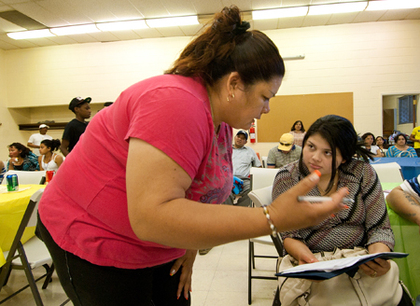
Doug Manners
May 21, 2012
Representatives of Virginia Organizing are canvassing the Harrisonburg area on a “listening project” to gather input and stories from the Latino community about Section 287g.
The law known as 287g allows local and state police to receive training from Immigration and Customs Enforcement to screen for immigration status — screenings that can eventually lead to deportation for those suspects found to be in the country illegally.
The Rockingham and Shenandoah county sheriff’s offices are two of the six departments in Virginia involved in the program.
Immigration officials say the 287g program helps to identify and report dangerous aliens to ICE.
Opponents, however, contend that it leads to racial profiling and makes immigrants — in particular Hispanics — fearful about contacting law enforcement when in trouble.
About 100 people gathered Saturday evening at Blessed Sacrament Catholic Church for a screening of the PBS documentary “Lost in Detention,” an investigation into the federal government’s immigration policies, and to discuss local law enforcement’s participation in the 287g program.
Virginia Organizing, the sponsor of the evening’s program, is a nonprofit group that advocates for various causes, including immigration rights.
Aaron Caruso, an attorney from Washington, D.C., who specializes in immigration law, pointed to a panel of his colleagues seated to his left. Two of the men are white and one is Hispanic.
“If you were to ask, ‘Which one do you think is maybe not a U.S. citizen?’” most would likely say Manuel Ochoa, he said, looking at the smiling Hispanic man seated at the far left. “And the police officers do that. And they don’t always do it with the good humor that we would do.”
All are U.S. citizens, he said.
If a police officer wants to pull someone over, Caruso added, it would take about 10 seconds for him to find a legitimate reason to do so.
“I doubt there are more than five people here that are going to be able to pull out of the parking lot and travel one block without violating some traffic law,” Caruso said. “We have literally seen people charged for going 56 [miles per hour] in a 55-[mph] zone.”
Wilfredo Flores, a volunteer with Virginia Organizing, said through a translator that more people from the local Latino community must share their stories.
“I know two people who were racially profiled and they’re not here [tonight],” he said. “Where are they? We need to stand up and let people know what’s happening.”
Officials with the Rockingham County Sheriff’s Office have long insisted that the 287g program does not target illegal immigrants who otherwise follow the law.
“We do not participate in profiling in any way,” Sheriff Bryan Hutcheson said in January. “Folks come into our jail having been arrested for something else. They’re not arrested upon being questioned about where they were born; they were only arrested for breaking another law.”
The sheriff’s office became a part of the 287g program in 2007. Through February, 539 people were placed on detainers and 282 were deported, according to figures compiled by the Virginia Organizing.
A detainer is a request that ICE be made aware of an arrest before someone is released from custody.
Opponents of the law say the program alienates law-abiding citizens from local law enforcement.
“We’re trying to organize a little bit to change [the program] so that our police will have a better relationship with the Latino community,” said Isabel Castillo.
Contact Doug Manners at 574-6293 or dmanners@dnronline.com




